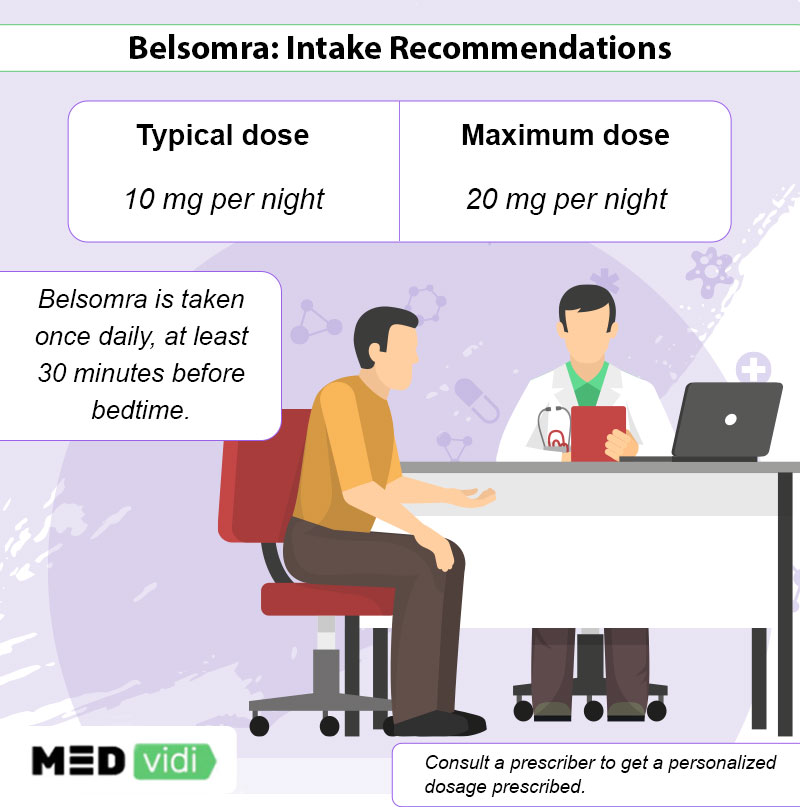According to the
Belsomra is one of the various sleeping pills approved for insomnia treatment. In this post, let’s review its mechanism of action, dosage options, side effects, and other basic facts about this drug.
Start your journey to better mental health with our free online assessment.
What is Belsomra
Belsomra is an
Belsomra is a controlled substance (
How Does Belsomra Work
Belsomra stops orexin activity in the brain; orexin is the brain chemical that keeps the brain awake and alert. When the chemical’s activities are halted, the brain does not get a message to wake up, hence
Suvorexant takes effect with the first dose and has a half-life of 12 hours. The half-life can be longer in a person 65 years old and above, a patient with other medical conditions, or those using other medication. The drug remains in the body for two to three days before elimination from the system.
Consult a doctor to know if Belsomra is the best choice for insomnia treatment for you.
Belsomra (Suvorexant) Dosage
Belsomra is available as an oral tablet of four strengths: 5 mg, 10 mg, 15 mg, and 20 mg. The doctor initially prescribes a low dosage that is increased gradually to get to a patient’s appropriate amount. The standard daily dose is 10 mg, while the maximum dose is 20 mg daily. It also depends on a patient’s age, the severity of the sleep disorder, other medical conditions, and response to treatment.
Belsomra is administered once daily, at least thirty minutes before bedtime. A person should only take sleep medicine Belsomra if they can devote at least six hours to sleep and always follow the doctor’s instructions.

Side Effects
Belsomra medication has both mild and severe side effects. Mild negative reactions may disappear after a few days and may not require medical intervention in that case. Any experience of severe side effects from these sleeping pills is rare and requires urgent medical attention.
| Mild Side Effects | Severe Side Effects |
|
|
Contact a doctor if you experience any side effects from the prescribed medication for insomnia.
Contraindications and Precautions
Belsomra sleep aid might not be suitable for some. A patient should disclose his/her medication history, allergies, and taking any other medication. Disclosing these significant aspects ensures the person gets an effective and suitable treatment.
Contraindications
To prevent adverse effects, patients with the following conditions should not use Belsomra for sleep disorders:
- Narcolepsy
- Pre-existing severe liver dysfunction
Precautions
- Do not take Belsomra together with alcohol. It can cause severe adverse mental and physical reactions.
- Belsomra decreases concentration and awareness. A person on medication should not drive or operate equipment or machinery.
- Belsomra should not be used with medications that cause drowsiness.
- Belsomra should be used with caution in pregnant and nursing women.
Withdrawal Symptoms
A doctor gradually weans off the patient from the sleeping pills to minimize withdrawal effects. Sudden discontinuation of suvorexant may cause withdrawals symptoms such as:
- Anxiety
- Cough
- Diarrhea
- Dizziness
- Dry mouth
- Nightmares
- Severe headaches
Conclusion
Belsomra is an FDA-approved prescription sleep aid for adults. It is an effective treatment for patients that struggle to fall or stay asleep. However, Belsomra has serious side effects, hence the need for a patient to follow the doctor’s instructions and contact a doctor immediately in case of severe side effects or withdrawal symptoms. A patient should not review the Belsomra dosage or discontinue the treatment without a doctor’s approval. If you want to know if you need Belsomra or another sleeping pill to improve your sleep, contact MEDvidi today.













